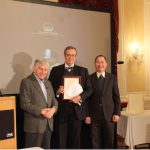February 22, 2026
Cybernetics: Norbert Wiener Publishes the Book Cybernetics
In 1948, Norbert Wiener published Cybernetics, a book that has had a major influence on research into artificial intelligence and control systems. Drawing from his World War II experiments with anti-aircraft systems, which anticipated the course of enemy planes by interpreting radar images, Wiener coined the term cybernetics from the Greek word for “steersman.”
1948: John von Neumann’s Remark on Machine Intelligence
John von Neumann, quoted by E.T. Jaynes, responded to a comment at a lecture that it was impossible for a machine to think by saying: “You insist that there is something a machine cannot do. If you will tell me precisely what it is that a machine cannot do, then I can always make a machine which will do just that!” Von Neumann was presumably alluding to the Church-Turing thesis, which asserts that any effective procedure can be simulated by a (generalized) computer.
Wiener’s Cybernetics and its Theoretical Foundations
With the influential book Cybernetics, first published in 1948, Norbert Wiener laid the theoretical foundations for the multidisciplinary field of cybernetics. This study focuses on controlling the flow of information in systems with feedback loops, whether biological, mechanical, cognitive, or social. At the core of Wiener’s theory is the message (information), sent and responded to (feedback); the functionality of a machine, organism, or society depends on the quality of messages. Information corrupted by noise prevents homeostasis, or equilibrium.
Yet, Cybernetics is as philosophical as it is technical, with the first chapter devoted to Newtonian and Bergsonian time and a continuous blending of the philosophical with the technical. This edition brings the 1961 second edition of the book back into print, complete with new forewords by Doug Hill and Sanjoy Mitter.
Wiener’s Warnings and Insights
Contemporary readers of Cybernetics will marvel at Wiener’s prescience—his warnings about “noise,” his disdain for “hucksters” and “gadget worshipers,” and his view of mass media as the single greatest anti-homeostatic force in society. This edition of Cybernetics offers a new generation access to a classic text.









